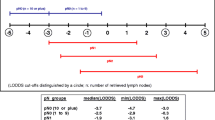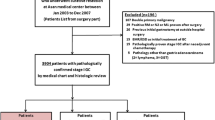Abstract
Objective
The lack of a simple criterion for gastric carcinoma creates a persistent challenge for clinicians trying to provide patients with useful prognostic information. The aim of this study was to identify baseline prognostic factors, and use this information to establish a simple criterion to predict outcome in gastric carcinoma.
Methods
Between 2005 and 2010, 155 patients with gastric carcinoma, were enrolled. Clinicopathologic prognostic factors were evaluated by univariate and multivariate analysis.
Results
Of the 155 patients, 48 (30.9%) died. Three independent poor prognostic factors were identified by multivariate analysis: gross type > or = 3 (hazard ratio [HR], 1.564; 95% CI, 1.067 to 2.294), peritoneal dissemination (HR, 3.750; 95% CI, 1.760 to 7.989) and lymphatic duct invasion (HR, 3.578; 95% CI, 1.422 to 9.004). One point was added for each category among three independent prognostic factors. Prognostic score (PS) was determined by an aggregate of these points for each category. There existed a significant difference between survival of patients with PS 0 or 1 and 2 (P < 0.0001).
Conclusion
Three poor prognostic factors were identified and a simple criteria was devised. Information from this analysis can be used to predict prognosis of gastric carcinoma with a strict stratification.
Similar content being viewed by others
References
Landry CS, Brock G, Scoggins CR, et al. A proposed staging system for gastric carcinoid tumors based on an analysis of 1,543 patients. Ann Surg Oncol, 2009, 16: 51–60.
Yasuda N, Nakashima O, Ohnaka T, et al. Novel clinical staging for patients with end-stage gastrointestinal carcinoma. Surg Today, 2006, 36: 25–29.
Nozoe T, Ninomiya M, Maeda T, et al. Prognostic nutritional index: a tool to predict the biological aggressiveness of gastric carcinoma. Surg Today, 2010, 40: 440–443.
Nozoe T, Iguchi T, Egashira A, et al. Pathological prognostic score as a simple criterion to predict outcome in gastric carcinoma. J Surg Oncol, 2010, 102: 73–76.
Park DI, Yun JW, Park JH, et al. HER-2/neu amplification is an independent prognostic factor in gastric cancer. Dig Dis Sci, 2006, 51: 1371–1379.
Matsubara J, Yamada Y, Hirashima Y, et al. Impact of insulin-like growth factor type 1 receptor, epidermal growth factor receptor, and HER2 expressions on outcomes of patients with gastric cancer. Clin Cancer Res, 2008, 14: 3022–3029.
Jung JJ, Noh S, Jeung HC, et al. Chemokine growth-regulated oncogene 1 as a putative biomarker for gastric cancer progression. Cancer Sci, 2010, 101: 2200–2206.
Zhang BH, Wang XH, Yue HY, et al. Clinical analysis of long-term survivors for unresectable hepatocellular carcinoma. Chinese-German J Clin Oncol, 2010, 9: 161–164.
Author information
Authors and Affiliations
Corresponding author
Rights and permissions
About this article
Cite this article
Zhang, B., Yue, H., Chen, L. et al. Novel prognostic score for patients with gastric carcinoma. Chin. -Ger. J. Clin. Oncol. 10, 699–704 (2011). https://doi.org/10.1007/s10330-011-0877-5
Received:
Revised:
Accepted:
Published:
Issue Date:
DOI: https://doi.org/10.1007/s10330-011-0877-5




